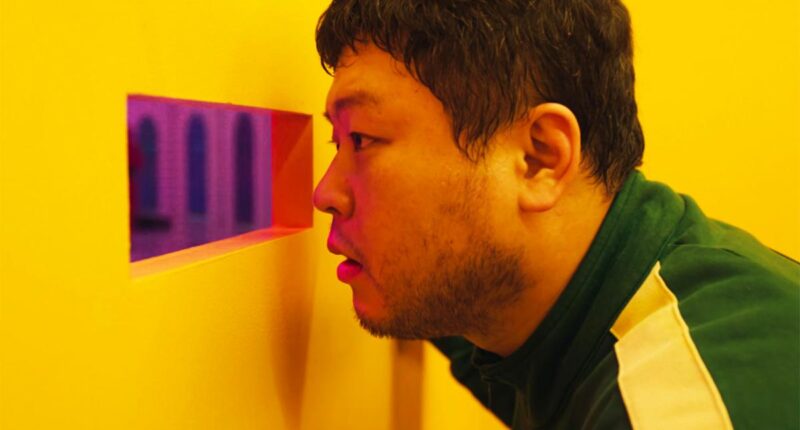By the time you finish this season of Squid Game, you will have witnessed hundreds of murders. Hundreds! It’s baked right into the premise. Other than shows that involve actual war, this kind of body count is just unprecedented. It’s certainly unique in that in virtually every case the murder victims are unarmed and helpless, and are getting killed because they messed up while playing a children’s game.
The question I ask myself when I watch things like this is simply, Why? Why am I watching something in which human lives are discarded like garbage, in graphic on-screen deaths so numerous you need the show to keep track of them for you? Is this some high-octane action-movie thing that’s using murder the way roller-coasters use downward slopes — to shock your system and give you a thrill? Does the violence have weight, does it cause emotional pain, does it speak to something broader than “look out for armed men in pink jumpsuits”? In short, what does the violence communicate, and is it a message worth hearing?
I’m wrestling with this question, I’ll admit. That’s because I think it’s very obvious Squid Game does, indeed, have something to say. The cartoonish bluntness with which its premise is stated — poor and indebted people are pitted against one another in sadistic games for a chance to win enough money to become solvent again, in a sham quasi-democracy overseen by the world’s richest men — tricks the mind into thinking it’s simplistic.
But read that premise again, and tell me how it differs from conditions on the ground right here and now. Friends, the real world is simplistic at this point. Just as the lethal games are designed to evoke fun childhood pastimes, Squid Game just renders the real world’s cruel absurdity in caricature form.
There is, however, such a thing as diminishing returns. With only one episode remaining in this short season, and a longer one behind us already, it’s fair to wonder what this heap of several hundred green-tracksuited corpses tells us that we didn’t learn from the previous pile.
As the game of Mingle progressed and the survivors watched from behind closed doors as stragglers got mercilessly machine-gunned to death — or near-death, if they’re unlucky enough to become part of the organ-harvesting black market — I was horrified, as I was supposed to be. I was impressed by the continued audacity of writer-director-creator Hwang Dong-hyuk’s vision, a vast and colorful carnival of the most in-your-face slaughter of the innocent you’re going to see on any show that doesn’t involve dragons. I was alternately riveted by each attempt our main characters made to team up with the correct number of players to make it into a saferoom and survive the round, and aghast when bad luck or human interference caused them to be separated or, worse, to die outright.
I was impressed by how the soft-hearted team of mother-son pair Geum-ja and Yong-sik and their friends Hyun-ju and Young-mi instinctively kicked the unstable shaman out of their group when the number of players called for was just four instead of five, and how this came back to bite them when she began rallying acolytes to her side for the vote after the game. I was gladdened to see player 246, the carnival caricaturist with the sick daughter, hook up with the rest of the familiar faces. I was consistently surprised by the actions of “Young-il,” secretly the Game’s Front Man — how at times he seemed genuinely willing to sacrifice himself for others, but also didn’t hesitate to kill a man with his bare hands in order to ensure his and Jung-bae’s continued survival. I was devastated right along with Hyun-ju when her friend Young-Mi got stranded outside a room and gunned down — and I was convinced by Myung-gi, who replaced her, that he did so in order to save the lives of those who remained, since there was no chance of rescuing her and no chance of having the right number of people otherwise.
That’s the thing about Squid Game: It gets me every time. However skeptical I am about the need for a second season — and I’m very skeptical, even as I enjoy the results…well, I enjoy the results, don’t I? This is, quite simply, fantastically well-done television — engaging, thrilling, provocative, sad, funny, bizarre, gorgeous to look at, and rooted in games as well-executed as any competition I can remember watching. It’s like if the entire Star Wars series was built on podracing, but the Sandpeople were blowing the driver’s heads off at routine intervals. It’s that fast-paced, that gripping, and that insanely violent.
And the violence continues after the game wraps and the vote comes down to a tie. The hostilities begin when Thanos and his minion Nam-gyu bully timid Min-su, who changed his vote from Yes to No, and Myung-gi, who stands up for him despite knowing Thanos already has it in for him over the crypto flop he promoted. But just when it seems Thanos is going to strangle Myung-gi to death (aw, and he was trying to patch things up with his pregnant ex Jun-hee to boot!), Myung-gi stabs Thanos in the throat with one of the forks that the Game-master strategically issued to the players with dinner.
That being said, I’m suspecting more and more that we’re getting half a Squid Game this season. We’ve only gotten through three out of a total of six games. Even if we wanted to roll right into Game #4, we’ll have to wait until the inevitable after-hours conflict between the two sides, Team X and Team O, resolves itself, with however much violence that entails. Perhaps enough people will die that only one more game is required, but that would feel like a bit of a cheat on the show’s part. Plus, Jun-ho and Woo-seok’s search and rescue team, almost certainly being undermined by a traitorous Captain Park, has yet to reach the island. And most tellingly, Season 3 has already been greenlit. Even so, there’s a lot to cram into that final 60 minutes. Are you not entertained? I am, god help me.
Sean T. Collins (@theseantcollins) writes about TV for Rolling Stone, Vulture, The New York Times, and anyplace that will have him, really. He and his family live on Long Island.
(function(d, s, id) {
var js, fjs = d.getElementsByTagName(s)[0];
if (d.getElementById(id)) return;
js = d.createElement(s); js.id = id;
js.src = “//connect.facebook.net/en_US/sdk.js#xfbml=1&appId=823934954307605&version=v2.8”;
fjs.parentNode.insertBefore(js, fjs);
}(document, ‘script’, ‘facebook-jssdk’));

















